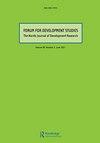The Migration-Development Nexus Revisited: Immigrant Organizations and the Swedish Policy Framework for Development and Humanitarian Assistance
IF 1.1
Q3 DEVELOPMENT STUDIES
引用次数: 2
Abstract
ABSTRACT Within the migration-development nexus, cooperation with immigrant organizations is often considered useful by governments and aid agencies. Due to acquaintance with home-country conditions and capacity to transfer remittances, migrants are increasingly viewed as contributors to aid and development. The Swedish government has a similar approach and views migrants and their associations as an asset. At the same time, research on home-country activities among Swedish immigrant organizations (SIOs) is scarce and little is known about their contributions. Based on qualitative and quantitative data on publicly funded SIOs, we explore the alignment between their activities and the Swedish policy goals of humanitarian aid and development cooperation. While few activities align directly, other activities align indirectly since they mainly reflect sectoral targets of the policy goals. We also find few cases of formalized and systematic collaboration with Swedish aid financiers. In comparison with cooperation practices in other European contexts, this suggests deficits in terms of professionalization of SIOs, marginalization in development cooperation and lack of opportunity structures for SIOs. Few SIOs are also engaged in home-country development and humanitarian assistance. A possible explanation is the institutional role that immigrant organizations historically have been granted in the Swedish context. If these deficits are addressed, SIOs could potentially enhance the Swedish approach to aid and development assistance.重新审视移民-发展关系:移民组织与瑞典发展和人道主义援助政策框架
摘要在移民与发展的关系中,政府和援助机构通常认为与移民组织的合作是有益的。由于了解母国的情况和汇款能力,移民越来越被视为援助和发展的贡献者。瑞典政府也采取了类似的做法,并将移民及其协会视为一种资产。与此同时,对瑞典移民组织在母国活动的研究很少,对他们的贡献也知之甚少。根据公共资助的SIO的定性和定量数据,我们探讨了它们的活动与瑞典人道主义援助和发展合作的政策目标之间的一致性。虽然很少有活动是直接一致的,但其他活动是间接一致的,因为它们主要反映了政策目标的部门目标。我们还发现,与瑞典援助资助者进行正式和系统合作的案例很少。与其他欧洲背景下的合作做法相比,这表明SIO在专业化、发展合作边缘化和缺乏机会结构方面存在缺陷。很少有SIO也参与母国发展和人道主义援助。一种可能的解释是移民组织在瑞典历史上被赋予的机构作用。如果这些赤字得到解决,SIO可能会加强瑞典在援助和发展援助方面的做法。
本文章由计算机程序翻译,如有差异,请以英文原文为准。
求助全文
约1分钟内获得全文
求助全文
来源期刊

FORUM FOR DEVELOPMENT STUDIES
DEVELOPMENT STUDIES-
CiteScore
1.80
自引率
14.30%
发文量
24
期刊介绍:
Forum for Development Studies was established in 1974, and soon became the leading Norwegian journal for development research. While this position has been consolidated, Forum has gradually become an international journal, with its main constituency in the Nordic countries. The journal is owned by the Norwegian Institute of International Affairs (NUPI) and the Norwegian Association for Development Research. Forum aims to be a platform for development research broadly defined – including the social sciences, economics, history and law. All articles are double-blind peer-reviewed. In order to maintain the journal as a meeting place for different disciplines, we encourage authors to communicate across disciplinary boundaries. Contributions that limit the use of exclusive terminology and frame the questions explored in ways that are accessible to the whole range of the Journal''s readership will be given priority.
 求助内容:
求助内容: 应助结果提醒方式:
应助结果提醒方式:


